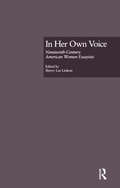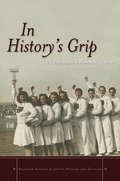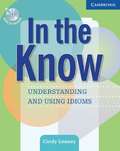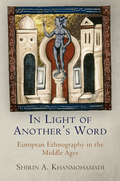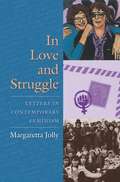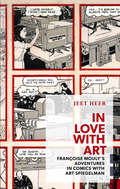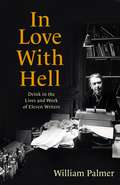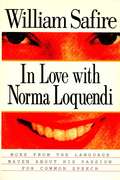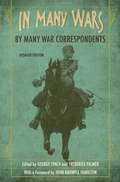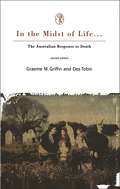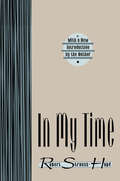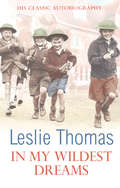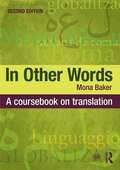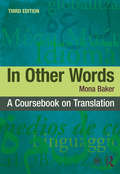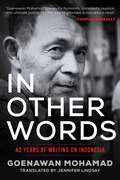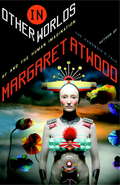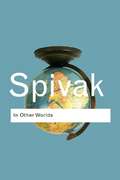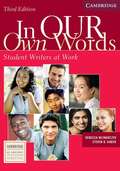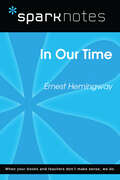- Table View
- List View
In Gratitude for All the Gifts
by Magdalena KayIn Gratitude for All the Gifts explores the literary and cultural links between the bestselling, Nobel Prize-winning Northern Irish poet Seamus Heaney and the preeminent Eastern European poets of the twentieth century, including fellow Nobel laureate Czeslaw Milosz and Zbigniew Herbert. Magdalena Kay opens new ground in comparative literary studies with her close analysis of Heaney's poetic work from the perspective of the English-speaking West's attraction, and especially Heane''s own attraction, to Eastern European poetry.While placing Milosz and Herbert in their cultural contexts and keeping an eye on the poems in their original Polish, this innovative and energetic study focuses on how Heaney encountered their work in translation. In Gratitude for All the Gifts thus allows us to see what happens when poetic forms, histories, and themes travel between countries and encourages us to understand cultural crossing not just thematically, but also in terms of form, voice, and aesthetic intent.
In Her Own Voice: Nineteenth-Century American Women Essayists (Gender and Genre in Literature)
by Sherry L. LinkonFirst published in 1998. Routledge is an imprint of Taylor & Francis, an informa company. In Her Own Voice examines the literary history of women’s nonfiction writing through studies of individual writers, their works, and their careers. The essays in this collection consider the development of women’s public voices, relationships between women essayists and their editors and readers, and the fuzzy line that divides—or seems to divide—fiction from nonfiction. The book includes studies of some of the best known American women essayists, including Margaret Fuller, Lydia Maria Child, and Fanny Fern, and articles on women writers whose work has received very little attention, such as Gail Hamilton, Anna Julia Cooper, Ann Sophia Stephens, and Zitkala-Sa.
In History's Grip: Philip Roth's Newark Trilogy
by Michael KimmageIn History's Gripconcentrates on the literature of Philip Roth, one of America's greatest writers, and in particular onAmerican Pastoral,I Married a Communist, andThe Human Stain. Each of these novels from the 1990s uses Newark, New Jersey, to explore American history and character. Each features a protagonist who grows up in and then leaves Newark, after which he is undone by a historically generated crisis. The city's twentieth-century decline from immigrant metropolis to postindustrial disaster completes the motif of history and its terrifying power over individual destiny. In History's Gripis the first critical study to foreground the city of Newark as the source of Roth's inspiration, and to scrutinize a subject Roth was accused of avoiding as a younger writer-history. In so doing, the book brings together the two halves of Roth's decades-long career: the first featuring characters who live outside of history's grip; the second, characters entrapped in historical patterns beyond their ken and control.
In Joy Still Felt: The Autobiography of Isaac Asimov, 1954-1978
by Isaac AsimovAsimov wrote a two volume autobiography, of which this is volume II.
In The Know: Understanding And Using Idioms
by Cindy LeaneyIn the Know teaches over 800 colorful idioms in English. The book groups the idioms into units depending on whether the idioms relate to such concepts as danger or honesty, or whether they contain colors or parts of the body, etc. Each unit has a clear four-page format that presents the idioms, explores their meaning, and practices their use.
In Light of Another's Word
by Shirin A. KhanmohamadiChallenging the traditional conception of medieval Europe as insular and even xenophobic, Shirin A. Khanmohamadi's In Light of Another's Word looks to early ethnographic writers who were surprisingly aware of their own otherness, especially when faced with the far-flung peoples and cultures they meant to describe. These authors--William of Rubruck among the Mongols, "John Mandeville" cataloguing the world's diverse wonders, Geraldus Cambrensis describing the manners of the twelfth-century Welsh, and Jean de Joinville in his account of the various Saracens encountered on the Seventh Crusade--display an uncanny ability to see and understand from the perspective of the very strangers who are their subjects.Khanmohamadi elaborates on a distinctive late medieval ethnographic poetics marked by both a profound openness to alternative perspectives and voices and a sense of the formidable threat of such openness to Europe's governing religious and cultural orthodoxies. That we can hear the voices of medieval Europe's others in these narratives in spite of such orthodoxies allows us to take full measure of the productive forces of disorientation and destabilization at work on these early ethnographic writers.Poised at the intersection of medieval studies, anthropology, and visual culture, In Light of Another's Word is an innovative departure from each, extending existing studies of medieval travel writing into the realm of poetics, of ethnographic form into the premodern realm, and of early visual culture into the realm of ethnographic encounter.
In Love and Struggle: Letters in Contemporary Feminism (Gender and Culture Series)
by Margaretta JollyWinner of the 2009 Feminist and Women's Studies Association Book PrizeDo you think I can be a feminist mother? Did I make you and your kisses up in my mind? Will you join our military protest at the gate? Will you feed the kids when I'm in prison? Are you able to forgive me for breaking off this correspondence because you are a man?During the women's movement of the 1970s and 1980s, feminists in the United States and Britain reinvented the image of the woman letter writer. Symbolically tearing up the love letter to an absent man, they wrote passionate letters to one another, exploring questions of sexuality, separatism, and strategy. These texts speak of the new interest women began to feel in one another and the new demands-and disappointments-these relationships would create. Margaretta Jolly provides the first cultural study of these letters, charting the evolution of feminist political consciousness from the height of the women's movement to today's e-mail networks. Jolly uncovers the passionate, contradictory emotions of both politics and letter writing and sets out the theory behind them as a fragile yet persistent ideal of care ethics, women's love, and epistolary art. She follows several compelling feminist relationships sustained through writing and confronts the mixed messages of the "open letter," which complicated political relations between women (such as Audre Lorde's "Open Letter to Mary Daly," which called out white feminists for their implicit racism).Jolly recovers the unsung literature of lesbianism and feminist romance, examines the ambivalent feelings within mother-daughter correspondences, and considers letter-writing campaigns during the peace movement. She concludes with a discussion of the ethical dilemma surrounding care versus autonomy and the meaning behind the burning or saving of letters. Letters that chart love stories, letters stowed away in attics, letters burnt at the end of romances, bittersweet letters written but never sent... this fascinating glimpse into women's intimate archives illuminates one of feminism's central concerns-that all relationships are political-and uniquely recasts a social movement in very emotional terms.
In Love and Struggle: Letters in Contemporary Feminism
by Margaretta JollyMargaretta Jolly provides the first cultural study of women's letters during the 1970s and 1980s, tracing the evolution of feminist political consciousness from the height of the women's movement to today's global networks. Jolly makes sense of the contradictory emotions of letter writing and captures a fragile yet persistent ideal of care, women's love, and epistolary art. From lesbian love letters to dispatches from women's encampments at Greenham Common and the Fourth World Conference on Women in Beijing, from letters exchanged between mothers and daughters to the spread of feminist internet communities, Jolly provides a fascinating glimpse into the intimate archives of contemporary women.
In Love with Art: Françoise Mouly's Adventures in Comics with Art Spiegelman (Exploded Views)
by Jeet HeerIn a partnership spanning four decades, Francoise Mouly and Art Spiegelman have been the pre-eminent power couple of cutting-edge graphic art. From Raw magazine to the New York, where she serves as art editor, Mouly and Spiegelman have revolutionized the art. In Love with Art profiles the pair and interviews Chris Ware, Dan Clowes, Adrian Tomine and more.
In Love with Hell: Drink in the Lives and Work of Eleven Writers
by William Palmer'Sympathetic and wonderfully perceptive . . . a heartbreaking read'NICK COHEN, Critic'Wise, witty and empathetic . . . outstanding'JIM CRACE'A fascinating treatment of the age-old problem of writers and drink which displays the same subtle qualities as William Palmer's own undervalued novels'D. J. TAYLORAn 'enjoyable exploration of an enduringly fascinating subject . . . [Palmer] is above all a dispassionate critic, and is always attentive to, and unwaveringly perceptive about the art of his subjects as well as their relationship with alcohol . . . [his] treatment is even-handed and largely without judgement. He tries to understand, without either condoning or censuring, the impulses behind often reprehensible behaviour'SOUMYA BHATTACHARYA, New Statesman'A vastly absorbing and entertaining study of this ever-interesting subject'ANDREW DAVIES, screenwriter and novelist'In Love with Hell is a fascinating and beautifully written account of the lives of eleven British and American authors whose addiction to alcohol may have been a necessary adjunct to their writing but ruined their lives. Palmer's succinct biographies contain fine descriptions of the writers, their work and the times they lived in; and there are convincing insights into what led so many authors to take to drink.'PIERS PAUL READWhy do some writers destroy themselves by drinking alcohol? Before our health-conscious age it would be true to say that many writers drank what we now regard as excessive amounts. Graham Greene, for instance, drank on a daily basis quantities of spirits and wine and beer most doctors would consider as being dangerous to his health. But he was rarely out of control and lived with his considerable wits intact to the age of eighty-six. W. H. Auden drank the most of a bottle of spirits a day, but also worked hard and steadily every day until his death. Even T. S. Eliot, for all his pontifical demeanour, was extremely fond of gin and was once observed completely drunk on a London Tube station by a startled friend. These were not writers who are generally regarded as alcoholics. 'Alcoholic' is, in any case, a slippery word, as exemplified by Dylan Thomas's definition of an alcoholic as 'someone you dislike who drinks as much as you.' The word is still controversial and often misunderstood and misapplied. What acclaimed novelist and poet William Palmer's book is interested in is the effect that heavy drinking had on writers, how they lived with it and were sometimes destroyed by it, and how they described the whole private and social world of the drinker in their work.He looks at Patrick Hamilton ('the feverish magic that alcohol can work'); Jean Rhys ('As soon as I sober up I start again'); Charles Jackson ('Delirium is a disease of the night'); Malcolm Lowry ('I love hell. I can't wait to go back there'); Dylan Thomas ('A womb with a view'); John Cheever ('The singing of the bottles in the pantry'); Flann O'Brien ('A pint of plain is your only man'); Anthony Burgess ('Writing is an agony mitigated by drink'); Kingsley Amis ('Beer makes you drunk'); Richard Yates ('The road to Revolutionary Road'); and Elizabeth Bishop ('The writer's writer's writer').
In Love with Hell: Drink in the Lives and Work of Eleven Writers
by William Palmer'Sympathetic and wonderfully perceptive . . . a heartbreaking read'NICK COHEN, Critic'Wise, witty and empathetic . . . outstanding'JIM CRACE'A fascinating treatment of the age-old problem of writers and drink which displays the same subtle qualities as William Palmer's own undervalued novels'D. J. TAYLOR'A vastly absorbing and entertaining study of this ever-interesting subject'ANDREW DAVIES, screenwriter and novelist'In Love with Hell is a fascinating and beautifully written account of the lives of eleven British and American authors whose addiction to alcohol may have been a necessary adjunct to their writing but ruined their lives. Palmer's succinct biographies contain fine descriptions of the writers, their work and the times they lived in; and there are convincing insights into what led so many authors to take to drink.'PIERS PAUL READWhy do some writers destroy themselves by drinking alcohol? Before our health-conscious age it would be true to say that many writers drank what we now regard as excessive amounts. Graham Greene, for instance, drank on a daily basis quantities of spirits and wine and beer most doctors would consider as being dangerous to his health. But he was rarely out of control and lived with his considerable wits intact to the age of eighty-six. W. H. Auden drank the most of a bottle of spirits a day, but also worked hard and steadily every day until his death. Even T. S. Eliot, for all his pontifical demeanour, was extremely fond of gin and was once observed completely drunk on a London Tube station by a startled friend. These were not writers who are generally regarded as alcoholics. 'Alcoholic' is, in any case, a slippery word, as exemplified by Dylan Thomas's definition of an alcoholic as 'someone you dislike who drinks as much as you.' The word is still controversial and often misunderstood and misapplied. What acclaimed novelist and poet William Palmer's book is interested in is the effect that heavy drinking had on writers, how they lived with it and were sometimes destroyed by it, and how they described the whole private and social world of the drinker in their work.He looks at Patrick Hamilton ('the feverish magic that alcohol can work'); Jean Rhys ('As soon as I sober up I start again'); Charles Jackson ('Delirium is a disease of the night'); Malcolm Lowry ('I love hell. I can't wait to go back there'); Dylan Thomas ('A womb with a view'); John Cheever ('The singing of the bottles in the pantry'); Flann O'Brien ('A pint of plain is your only man'); Anthony Burgess ('Writing is an agony mitigated by drink'); Kingsley Amis ('Beer makes you drunk'); Richard Yates ('The road to Revolutionary Road'); and Elizabeth Bishop ('The writer's writer's writer').
In Love with Norma Loquendi
by William SafireThe Pulitzer Prize-winning columnist describes his lifelong fascination with Norma Loquendi--common speech--in a collection of columns that celebrates the mysteries and continual evolution of the English language.From the Hardcover edition.
In Many Wars, by Many War Correspondents (From Our Own Correspondent)
by George Lynch“There are few people in the world who have more opportunity for getting close to the hot interesting things of one’s time than the special correspondent of a great paper,” George Lynch, a veteran British correspondent, wrote in Impressions of a War Correspondent, published in 1903. He made it all sound glorious, just the way war correspondents like to recount their experiences on the battlefield. But in a few months he had less to exult about. Lynch and a distinguished throng of foreign correspondents with high hopes of a good story assembled in Tokyo to cover the Russo-Japanese War—a monumental conflict that would mark the first modern defeat of a Western force by an Asian one—only to discover that the authorities would not let them “close to the hot interesting things.” Corralled in the Imperial Hotel, the journalists had nothing much to do except tell stories in the bar and write about local flora. A few of them, including Jack London and Richard Harding Davis, decided to contribute short autobiographical stories recounting their most exciting journalistic experiences for a book to be edited by Lynch and his American colleague, Frederick Palmer. The correspondents told their tales in different ways—prose, poems, sketches, and even a short play. Their stories recounted their routines, failures, and triumphs, including durviving battles and waiting to see action. One contributor imagines bewhiskered correspondents in 1950 still awaiting permission from Japan to go to the front—only to learn the war had been over for thirty-nine years. Printed locally by a Japanese printer and largely forgotten until now, In Many Wars, by Many War Correspondents offers colorful stories and insights about the lives and personalities of some of history’s most celebrated war correspondents. With a foreword by John Maxwell Hamilton that chronicles the circumstances under which the contributors compiled the book, this new edition opens a window into the fascinating world of foreign newsgathering at the turn of the twentieth century.
In The Midst Of Life
by Des Tobin Graeme M GriffinThis is a thoroughly useful, authoritative and compassionate book about the last taboo subject-death. In exploring our responses to death, it reveals a great deal about Australian society. There is grim humour in the practical details of burial in the days of pick and shovel-and a priest if you were lucky. Stories of elaborate Victorian mourning etiquette, of poignant personal histories recorded on gravestones, of vehement debates about cremation, and much more, make good reading. The authors-a theologian and a funeral director-use this frank social history to look at questions we often avoid. What is grief? How can we help ourselves and others through it? What choices do we have for farewelling our loved ones? Are the rituals of churches, funeral parlours and cemeteries flexible enough to meet our endlessly varied needs? Both professional and general readers will find many answers and yet more questions in this informative and reassuring book.
In My Time
by Robert Strausz-HupeIn My Time is a vivid account of the fascinating life of Robert Strausz-Hupe, who served American presidents for twenty years in a variety of diplomatic posts. It is a life filled with both excitement and tragedy. In this autobiography, Strausz-Hupe covers a wide range of topics, including his youth in Vienna, his familial background, and his schooling. The author also discusses his emigration to the United States, describing his initial impressions of the country as well as how he viewed the changes that were occurring in American society and culture.Strausz-Hupe has written a poignant introduction for the republication of this volume. He explains how he reaches out to history for an explanation of who he is as an individual. Just as entire nations should learn from history, so should individuals, as Strausz-Hupe has attempted to do in his autobiography.Robert Strausz-Hupe is one of those increasingly rare, universally educated men whose minds conform only to their own beliefs and findings. His views of events such as the rise of German Nazism, or Chinese Communism, or the world of the theater in Europe between the two world wars are always fresh, exciting, and informed. In My Time will be enjoyed by all who read it, especially historians, political theorists, and policymakers.
In My Wildest Dreams
by Leslie ThomasFrom Barnardo boy to original virgin soldier; from apprentice journalist in London's Fleet Street to famous novelist...At times funny, at times sad, but always honest and utterly compulsive, Leslie Thomas's story is straight out of fiction. As an orphan, he picked his way through the rubble of post-war Britain and was sent on national service to the Far East. Later he became a Fleet Street reporter, with hilarious experiences to relate, and then became the bestselling author of The Virgin Soldiers - the novel that, although scandalous in its day, is now recognised as a classic of its kind. He is also the creator of Dangerous Davies: The Last Detective, which has been adapted into a popular television series. In 2005, Leslie Thomas was awarded an OBE for services to literature.With a new introduction for this edition, this is an amazing story, and Leslie Thomas's magic touch brings it crackling to life with warmth, wit and humour.
In Other Words
by Mona BakerIn Other Words is the definitive coursebook for anyone studying translation. Assuming no knowledge of foreign languages, it offers both a practical and theoretical guide to translation studies, and provides an important foundation for training professional translators. Drawing on modern linguistic theory, this best-selling text provides a solid base to inform and guide the many key decisions trainee translators have to make. Each chapter offers an explanation of key concepts, identifies potential sources of translation difficulties related to those concepts, and illustrates various strategies for resolving these difficulties. Authentic examples of translated texts from a wide variety of languages are examined, and practical exercises and further reading are included at the end of each chapter. The second edition has been fully revised to reflect recent developments in the field and new features include: A new chapter that addresses issues of ethics and ideology, in response to increased pressures on translators and interpreters to demonstrate accountability and awareness of the social impact of their decisions. Examples and exercises from new genres such as audiovisual translation, scientific translation, oral interpreting, website translation, and news/media translation. New project-driven exercises designed to support MA dissertation work Updated references and further reading. A companion website featuring further examples and tasks Written by Mona Baker, a leading international figure in the field, this key text is the essential coursebook for any student of translation studies.
In Other Words: A Coursebook on Translation
by Mona BakerIn Other Words is the definitive coursebook for anyone studying translation. Assuming no knowledge of foreign languages, it offers both a practical and theoretical guide to translation studies, and provides an important foundation for training professional translators. Drawing on modern linguistic theory, this best-selling text provides a solid base to inform and guide the many key decisions trainee translators have to make. Each chapter offers an explanation of key concepts, identifies potential sources of translation difficulties related to those concepts, and illustrates various strategies for resolving these difficulties. Authentic examples of translated texts from a wide variety of languages are examined, and practical exercises and further reading are included at the end of each chapter. The second edition has been fully revised to reflect recent developments in the field and new features include: A new chapter that addresses issues of ethics and ideology, in response to increased pressures on translators and interpreters to demonstrate accountability and awareness of the social impact of their decisions. Examples and exercises from new genres such as audiovisual translation, scientific translation, oral interpreting, website translation, and news/media translation. New project-driven exercises designed to support MA dissertation work Updated references and further reading. A companion website featuring further examples and tasks Written by Mona Baker, a leading international figure in the field, this key text is the essential coursebook for any student of translation studies.
In Other Words: A Coursebook on Translation
by Mona BakerIn Other Words has been the definitive coursebook for students studying translation for nearly three decades. Assuming no knowledge of foreign languages, it offers a practical guide based on extensive research in areas as varied as lexis, grammar, pragmatics, semiotics and ethics. It thus provides a solid basis for training a new generation of well-informed, critical students of translation. Drawing on linguistic theory and social semiotics, the third edition of this best-selling text guides trainee translators through the variety of decisions they will have to make throughout their career. Each chapter offers an explanation of key concepts, identifies potential sources of translation difficulties related to those concepts and illustrates various strategies for resolving these difficulties. Authentic examples of translated texts from a wide variety of languages and genres are examined, and practical exercises and further reading are included at the end of each chapter. The third edition has been fully revised to reflect recent developments in the field and includes a new chapter that engages with the interplay between verbal and visual elements in genres as varied as children’s literature, comics, film, poetry and advertisements. This key text remains the essential coursebook for any student of translation studies.
In Other Words: 40 Years of Writing on Indonesia
by Goenawan MohamadA wide-ranging and beautiful collection of essays from one of world literature’s most important writers.Goenawan Mohamad is one of Indonesia’s foremost public intellectuals, and this translated volume of essays-spanning from 1968 to the present day-demonstrates the breadth of his perceptive and elegant commentary on literature, faith, mythology, politics, and history.Through the worst days of Indonesia's authoritarianism, in the face of the trauma of great violence and the chaos of democratic transition, Goenawan has never lost faith in the act of writing. Many of his essays from In Other Words were first published for Tempo, the Indonesian weekly magazine that he founded in 1971. His writings bring nuance and sympathy to difficult histories, introduce doubt to damaging certainties, and apply clarity of thought and action to times of great upheaval. Activist, journalist, editor, essayist, poet, commentator, theater director, and playwright, Goenawan Mohamad brings an unparalleled and wide-ranging perspective to the world. These essays, translated by his long-time collaborator Jennifer Lindsay, reveal a vision both uniquely Indonesian and completely universal, and indisputably establish him as one of the leading political thinkers and cultural observers in the world today.
In Other Worlds: SF and the Human Imagination
by Margaret AtwoodNote: The electronic version of this title contains over thirty additional, illuminating eBook-exclusive illustrations by the author.At a time when speculative fiction seems less and less far-fetched, Margaret Atwood lends her distinctive voice and singular point of view to the genre in a series of essays that brilliantly illuminates the essential truths about the modern world. This is an exploration of her relationship with the literary form we have come to know as "science fiction," a relationship that has been lifelong, stretching from her days as a child reader in the 1940s, through her time as a graduate student at Harvard, where she worked on the Victorian ancestor of the form, and continuing as a writer and reviewer. This book brings together her three heretofore unpublished Ellmann Lectures from 2010: "Flying Rabbits," which begins with Atwood's early rabbit superhero creations, and goes on to speculate about masks, capes, weakling alter egos, and Things with Wings; "Burning Bushes," which follows her into Victorian otherlands and beyond; and "Dire Cartographies," which investigates Utopias and Dystopias. In Other Worlds also includes some of Atwood's key reviews and thoughts about the form. Among those writers discussed are Marge Piercy, Rider Haggard, Ursula Le Guin, Ishiguro, Bryher, Huxley, and Jonathan Swift. She elucidates the differences (as she sees them) between "science fiction" proper, and "speculative fiction," as well as between "sword and sorcery/fantasy" and "slipstream fiction." For all readers who have loved The Handmaid's Tale, Oryx and Crake, and The Year of the Flood, In Other Worlds is a must. From the Hardcover edition.
In Other Worlds: Essays In Cultural Politics (Routledge Classics)
by Gayatri Chakravorty SpivakIn this classic work, Gayatri Chakravorty Spivak, one of the leading and most influential cultural theorists working today, analyzes the relationship between language, women and culture in both Western and non-Western contexts. Developing an original integration of powerful contemporary methodologies – deconstruction, Marxism and feminism – Spivak turns this new model on major debates in the study of literature and culture, thus ensuring that In Other Worlds has become a valuable tool for studying our own and other worlds of culture.
In Our Own Words: Student Writers at Work
by Rebecca Mlynarczyk Steven B. HaberIn Our Own Words takes the unique approach of using student writing as a resource for writing instruction and idea development.
In Our Time (SparkNotes Literature Guide Series)
by SparkNotesIn Our Time (SparkNotes Literature Guide) by Ernest Hemingway Making the reading experience fun! Created by Harvard students for students everywhere, SparkNotes is a new breed of study guide: smarter, better, faster. Geared to what today's students need to know, SparkNotes provides: *Chapter-by-chapter analysis *Explanations of key themes, motifs, and symbols *A review quiz and essay topicsLively and accessible, these guides are perfect for late-night studying and writing papers

